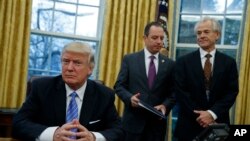President Donald Trump says phone conversations Wednesday with Mexican President Enrique Pena Nieto and Canadian Prime Minister Justin Trudeau persuaded him not to imminently withdraw the United States from their countries' three-way trade pact.
"They asked me to renegotiate. I will," Trump told reporters in the Oval Office. "I decided rather than terminating NAFTA, which would be a pretty big shock to the system, we will renegotiate."
Trump, sitting Thursday alongside Argentinian President Mauricio Macri, said, "I was going to terminate NAFTA as of two to three days from now." But, he added, "If I'm unable to make a fair deal ... for our workers and our companies, we will terminate NAFTA."
He reiterated his long-standing assertion that the 1994 trade agreement has been "very good for Canada. It has been very good for Mexico. But it has been horrible for the United States."
The U.S. president's softening tone on what is perceived as America's most crucial trade pact is being well-received.
"I am relieved," said Notre Dame University professor of finance Jeffrey Bergstrand, who notes trade agreements "not only lower tariffs, but create stability in the global value chain."
Trump has already withdrawn the United States from the 12-nation Trans-Pacific Partnership agreement negotiated by his predecessor, Barack Obama, although that deal had not been ratified by Congress.
A Mexican government statement on Wednesday's phone call between Trump and Pena Nieto stated the leaders agreed on the convenience of maintaining NAFTA and working with Canada to bring about successful negotiations.
A Canadian foreign ministry spokesman said Ottawa is "ready to come to the table at any time."
Trump targeted Canada this week for what he said was unfair trade practices and he ordered a new 20 percent tariff on Canadian lumber imports, which could add to the cost of buying new houses in the United States.
Trump's consent to keep the United States in NAFTA, at least for a while, "probably reflects increasing voices from the business community that these trade policies have been good," Professor Bergstrand at the Mendoza College of Business told VOA.
Many Mexican officials have called NAFTA a disappointment, saying it has brought slow economic growth despite increased investment in factories and industry.







